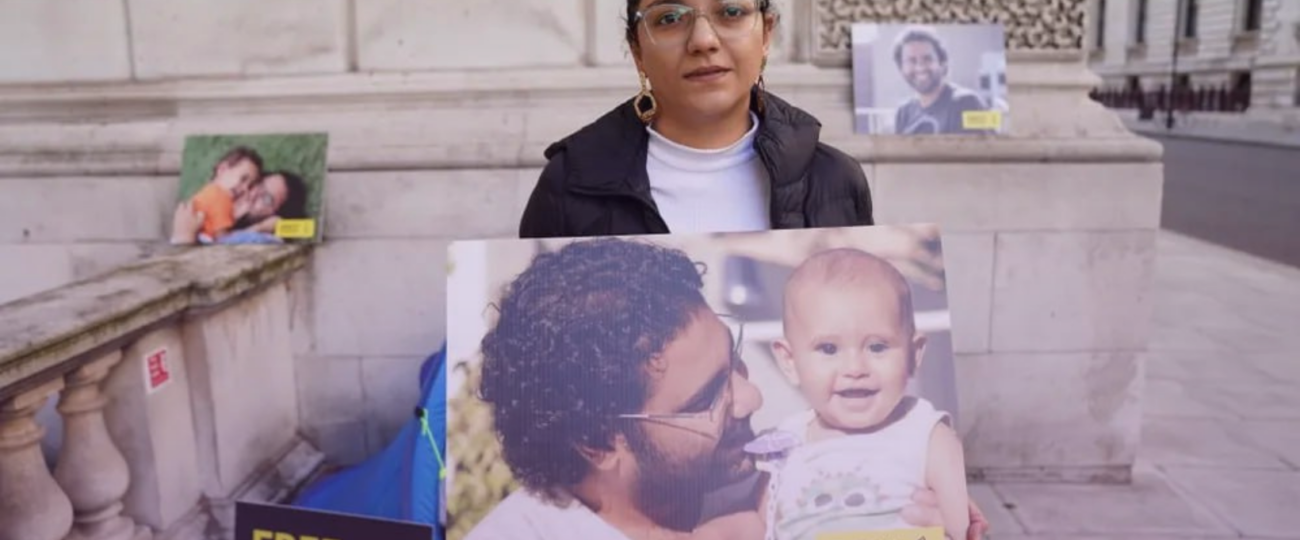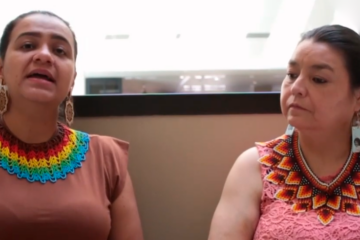Since 1952, when the British occupation left Egypt, the country have been ruled by the military. The Hosni Mubarak dictatorship lasted 30 years, and was overturned after the 2011 uprising, that started on January 25th, a day known as the “day of rage”. New elections happened in 2012, leading to the victory of Mohamed Morsi, from the Islamist party Muslim Brotherhood. His term lasted a year until it was cut short by the military coup led by General Abdel Fattah Al-Sisi in 2013. Since then, the Egyptian population has lived under an undemocratic and authoritarian regime.
Sanaa Seif is an Egyptian and British filmmaker and activist. Sanaa was present during the 2011 uprising and has been campaigning and advocating for the release of her brother, Alaa Abd El-Fattah, and other political prisoners under the Al-Sisi regime. Her actions in defense of these militants resulted in her own arrest on three occasions. In this interview from June 2023, Sanaa speaks about the current political context of Egypt and about her ongoing campaign for the release of human rights defenders in the country. Listen to the interview in English bellow:

While the 2011 protests were taking place, you could follow your parents and siblings in the struggle, becoming active in the movement from that moment on. What is your reading of the demonstrations of that period?What did it mean for the organization and reorganization of the movements in the country?
The main chants that people were saying in the streets were “bread, freedom, and social justice”. The main goal was to establish a democracy, and we don’t have that. So, the 2011 movements were defeated. Inflation is skyrocketing, the prices are much higher, the value of money is much less. Police brutality is still very present.
But, it is still significant and important in our country history because it was very strong, but it was also very peaceful. It was a moment of possibility and potential in our country, but we did several mistakes collectively —specially the organized political groups. We didn’t stand up for the value of democracy, and dealing with the complexity of our country, and our society, we just wanted the army to solve our social issues for us. Therefore, of course, the army took advantage of that. The military rule from now is not in disguise like before, and Abdul Fatah Khalil Al-Sisi has been our president for 10 years.
In Egypt, you’re always living this political dilemma between having either Islamic groups or the military in power. These are the organized groups; every other thing — liberal, leftists, conservatives, any civilian, or radical groups like us — is very small and not well organized, because the State doesn’t allow it. So, it was kind of known that once you have the societies open, the Islamic were the most popular opposition. They won elections, they won majority in Parliament and the presidency, and they ruled badly for a year. They came after a revolution, but didn’t do any reform with the police, they continued with the dictatorial laws against Christians… Every bad thing that was the reason behind the revolution was continuing, but instead of being in the name of the military, it was in the name of Islam.
The army took this as an opportunity for a coup, and throw away democracy basically. Of course, once the army was in power again, they oppressed everybody under the claim that they would be fighting terrorism and extremism. The army presented itself as secular, but they are just as conservative as the Muslim Brotherhood religiously, as sectarian as they were.
With an anti-democratic government, much is at stake beyond the lack of democracy itself. Can you give us a brief overview of the current political situation in your country?
About personal freedom, the State has some propaganda against the sexual harassment, which is becoming criminalized by law. But the actual violence against women has increased. There are now a lot of cases of girls arrested because they made videos on TikTok. There’s a classist aspect to that. If there’s an upper middle class girl who speaks English and who does these videos, and is an influencer in one of the posh areas of Egypt, that’s acceptable. But if there is a lower middle class girl who does these videos, she will get arrested for prostitution. Our current attorney general has been publishing public statements about family values. So girls, the LGBT community, any minority is much more chased.
Financially, our military is involved in all kinds of businesses, even in private companies that are part of the general intelligence. There is a very public case of a man who refused to give his company to the military, and he and his son were arrested for two years. A lot of communities were displaced because the military decided to build a mega project in the territory. The Italian oil company Eni started to extract liquefied natural gas (LNG) in Egypt, the same with British Petroleum. We don’t have freedom of press, so we don’t have much information, but the community around the LNG plants are denouncing the water pollution. Fisherman are saying that there’s no longer fish in their water.
During the 2011 mobilizations, you and other activists worked on editing and publishing the independent newspaper Al-Gornal. Can you tell us about this experience and about communication tools in the country?
Now we have around three main independent media outlets that are still managing to operate from inside the country. It’s very challenging to do that and a lot of journalists are arrested, but we still have some remnants of civil society that are pushing back. We used to have much more press outlets, newspapers, and others. Our mainstream media has all become controlled by the general intelligence, which also regulates the subjects of the news.
Back in 2011, I was 16. Most of the group that worked on Al-Gornal were my same age. We weren’t journalists, but we realized that there was a moment of freedom there that was kind of the exceptional, and we wanted to just make a point.
Sanaa Seif
People were talking freely on the internet, but we wanted a printed publication. For the content, we opened a Facebook page, and we made a call for articles. It was a very inspiring process. It was a monthly publication, and we had six issues. We used to distribute 25,000 copies for free with an impressive distribution network. It was really serious content, and the credit wasn’t to us, it was to the people who engaged with us.
During all these years of active participation in the militancy, you were arrested three times. Your brother, a militant in the struggle for human rights in Egypt, remains imprisoned until today. How have the campaigns for the release of imprisoned activists, including your brother, been going on?
My brother has been now in prison for nine years. At first, we used to advocate and campaign domestically, and this is still the case for most of the other prisoners. There are a lot of people campaigning and trying to advocate not only for the release of prisoners, but also for better conditions. You have to fight for everything, for every small right: to get them food, letters, to visit them. Nothing can be taken for granted. All of my arrests were because I was campaigning for my brother’s release and for the rest of the prisoners in general. His lawyer was arrested for representing him, he’s a journalist too.
My way of campaigning now is through lobbying with Western governments to address the human rights situation of Egypt. In Geneva, we struggled to change the travel advice to Egypt, saying that in this country it’s possible that you get arrested, and your passport will not protect you. This has paid off a little, and of course that’s thanks to the solidarity of people activists like us. For a year now I have been based in Cairo, but I’ve been traveling a lot and basically campaigning outside. I made it a point to stay in my country. It could be very risky to use Westerns spaces for campaigning for us Egyptians. So, I decided to do it and stay in the country so that there are no repercussions on my brother. In the UN climate conference, the exposure of the case that I made has offered me some protection. I’m able to live in Cairo, it’s still dangerous, and they might arrest me, but it’s not it’s not going to be an easy decision. It’s a calculated risk where there will be some political price.




